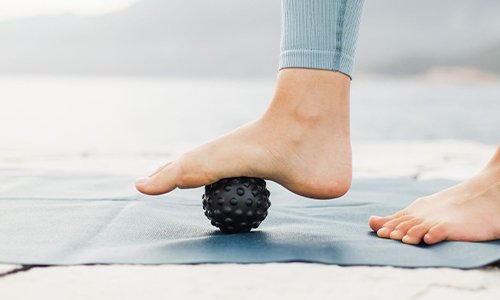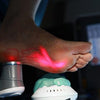Running Through Pain: Plantar Fasciitis in Marathon Runners

Plantar Fasciitis Explained
Plantar fasciitis is a painful ailment affecting the plantar fascia, which is a thick band of tissue that runs along the bottom of the foot linking the heel bone to the toes. This tissue works as a shock absorber, supporting the arch of the foot and assisting in weight distribution during activities such as running. Plantar fasciitis develops when the plantar fascia gets irritated or injured, and it can be hindering for marathon runners.
Plantar Fasciitis Symptoms
Plantar fasciitis in marathon runners frequently causes the following symptoms:
1. Heel Pain: The hallmark symptom is sharp, stabbing pain in the heel, usually near the bottom and front of the heel bone. The pain is usually the worst in the morning or after a time of rest.
2. Arch Pain: Some runners may experience pain or discomfort along their foot's arch.
3. Stiffness: After rest, the affected foot may feel stiff and tight.
4. Running Pain: Pain usually worsens while or after running, especially when pushing off the toes.
5. Discomfort While Standing: Standing or walking for long periods of time may amplify the pain.
Treatment Options for Plantar Fasciitis
1. Rest and Recovery: Rest is essential for healing the irritated plantar fascia. Marathon runners should minimize or temporarily discontinue training to avoid future injury.
2. Ice and Elevation: Applying ice to the affected area and elevating the foot will help reduce swelling and pain.
3. Stretching and Strengthening Exercises: Stretching the calf muscles and Achilles tendons on a regular basis will help reduce tension on the plantar fascia. Specific foot and ankle strengthening exercises can also assist support the arch.
4. Footwear: Purchase well-fitting running shoes with adequate arch support and cushioning. Custom orthotic inserts may also be effective.
5. Anti-Inflammatory medications: Nonsteroidal anti-inflammatory medications (NSAIDs) help reduce pain and inflammation temporarily. They should, however, be utilized under the supervision of a healthcare expert.
6. Physical Therapy: A physical therapist can create a customized treatment plan for you that may involve exercises, manual therapy, and modalities such as ultrasound or electrical stimulation.
7. Night Splints: Wearing night splints overnight can help keep the plantar fascia stretched, decreasing morning pain.
8. Corticosteroid Injections: A doctor may offer corticosteroid injections to relieve inflammation and pain in severe situations. However, because of the possibility of negative effects, these should be used with caution.
Plantar Fasciitis Prevention in Marathon Runners
Prevention is simpler and less unpleasant than treatment. Here are some preventative measures for plantar fasciitis:
1. Gradual Progression: Gradually increase training mileage and intensity to allow the body to adjust.
2. Proper Footwear: Purchase high-quality running shoes that are appropriate for your foot type and running style. Replace them on a regular basis.
3. Stretching and Strengthening: Include stretching and strengthening activities in your training program on a regular basis.
4. Pay Attention to Your Body: Pay attention to any indicators of discomfort or pain and address them as soon as possible.
5. Cross-Training: Include cross-training activities in your workout to avoid repetitive stress on your feet and heels.
6. Orthotics: If you have bio mechanical difficulties, unique orthotic inserts or customized shoe insoles may be beneficial.
7. Massage and Self-Care: Massage your calves, Achilles tendons, and the bottom of your foot on a regular basis to relieve tension.
8. Schedule rest days to give your body time to recover.
Plantar fasciitis may be a difficult and painful condition for marathon runners to deal with. It can, however, be prevented and effectively treated with the correct measures. Take care of your feet and handle any discomfort or pain as soon as possible to ensure a successful and pain-free marathon running experience. To reduce the possibility of plantar fasciitis interfering with your marathon ambitions, use effective training tactics, invest in the right gear, and prioritize self-care.





